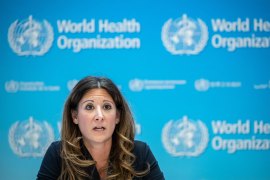State, Local, University Initiatives Address Health Disparities Among Minority Populations
- Detroit: CDC has awarded four local community health centers with a $1 million grant to help fund HIV/AIDS initiatives in the black community, the Detroit News reports. Blacks comprise 59% of the state's estimated 17,000 residents with HIV/AIDS, according to the Michigan Department of Community Health (Kozlowski, Detroit News, 10/30).
-
Florida Atlantic University: Nursing students at FAU for the past four years have taught health classes to Cherokee American Indian children, the South Florida Sun-Sentinel reports. In October, 50 students participated in the program and lived with the children at the Healthy Nations Summer Camp. They taught courses on nutrition, diabetes, tobacco use prevention and facilitated physical activities. The students also taught sexual education to high school students and distributed condoms, which are not always available on reservations, according to the Sun-Sentinel (Travis, South Florida Sun-Sentinel, 10/28).
-
Integris Health: Integris on Oct. 28 hosted a health summit in Oklahoma that sought to encourage blacks to take responsibility for their own health as a way to reduce health disparities in the community, the Oklahoman reports. The summit "served as a forum for doctors, dentists and other health professionals within the black community to discuss black health issues with civic and church leaders and the general public," according to the Oklahoman. Television show host, author and advocate Tavis Smiley, former National Basketball Association player Dominique Wilkins and National Medical Association Executive Director Mohammed Akhter were all keynote speakers at the summit (Hinton, Oklahoman, 10/28).
- Louisville, Ky.: Louisville-based Norton HealthCare and the American Heart Association announced on Tuesday that they will collaborate on an effort to offer no-cost blood pressure screenings and information about hypertension to the black community, the Louisville Courier-Journal reports. The groups will work with churches and schools in largely black communities in Louisville and Newburg, aiming to screen at least 1,000 black residents in the next three years (Yetter, Louisville Courier-Journal, 10/31).
- Seville, Fla.: The Alliance of Active Women program, a group of Hispanic women, seeks to help immigrant women find alternative ways to get breast cancer care and information, the Daytona Beach News-Journal reports. According to the News-Journal, Hispanic immigrant women often are uninsured, face language barriers and tend to get diagnosed in the later stages of breast cancer. The group started a breast cancer program when Ana Bolanos, the group's executive director, conducted a survey and found that migrant farm workers had limited knowledge about breast cancer. Through the program, women receive 30 days of training on how to educate others about breast cancer and teach them how to perform breast exams and recruit others to the program. The group this week plans to award 12 women who have completed the program with a certificate and also announce two bilingual "foto-novelas," comic book-style magazines that illustrate real-life experiences of women with breast cancer (Ramirez, Daytona Beach News-Journal, 10/29).
- Tulsa, Okla.: CDC has awarded eight American Indian tribes in the state $4.25 million over five years to fund health initiatives, state health officials announced on Tuesday, Tulsa World reports. The grant is a part of CDC's Racial and Ethnic Approaches to Community Health program and will be used for cardiovascular disease and diabetes prevention, behavior modification and system delivery policies among American Indians in Oklahoma, Kansas and Texas (Ruckman, Tulsa World, 10/31).
-
Virginia Commonwealth University: VCU is one of 40 institutions nationwide to receive a five-year, nearly $2 million grant from CDC's REACH program to improve infant mortality rates among blacks. The funds will support local infant mortality and prenatal awareness efforts in Richmond (VCU release, 10/30).
-
Wayne State University: The national Center for Substance Abuse Treatment has awarded WSU with a $2.5 million grant to go toward expanding its research and treatment efforts in HIV/AIDS patients, the Detroit Free Press reports. According to Mark Greenwald, associate professor of psychiatry and behavioral neurosciences, the money will help fund a project that "will address the complex needs of individuals experiencing co-occurring conditions of substance use or abuse and HIV or AIDS among a primarily African-American and uninsured or underinsured population" (Esan, Detroit Free Press, 10/30).
- Wyoming: CDC awarded the Northern Arapaho Tribe a five-year, $2 million grant address infant mortality on the Wind River Indian Reservation, the AP/Casper Star-Tribune, reports. The grant will go toward the tribe's Women, Infants and Children program and will "provide resources to support and assist pregnant women, new mothers and infants," according to the Arapaho WIC office (AP/Casper Star-Tribune, 10/27).
This is part of the Morning Briefing, a summary of health policy coverage from major news organizations. Sign up for an email subscription.






